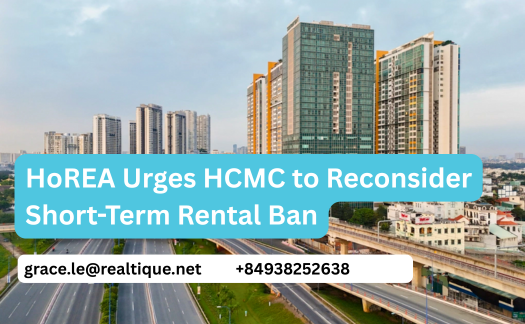HoREA Urges HCMC to Reconsider Short-Term Rental Ban
HoREA proposes HCMC reevaluate its ban on short-term rentals in apartments, suggesting regulation over prohibition to support tourism and the economy.
Table of Contents
HoREA Advocates for Regulated Short-Term Rentals in HCMC Apartments
The Ho Chi Minh City Real Estate Association (HoREA) has formally requested the city’s authorities to reconsider the prohibition of short-term rentals in apartment buildings. HoREA suggests that, instead of an outright ban, the city should regulate this practice as a conditional business activity, aligning with national housing laws and supporting the local economy.
Understanding the Legal Framework
HoREA points out that the current interpretation of the Housing Law 2023 by HCMC authorities may be overly restrictive. The law permits apartment owners to lease their units for both long-term and short-term stays, including daily or weekly rentals through platforms like Airbnb. Additionally, the Law on Residence 2013 defines “residence” as staying at a location for a certain period, without specifying duration, thereby encompassing short-term stays.
“The city’s understanding that only long-term rentals qualify as residential use, while short-term rentals do not, is inaccurate,” HoREA stated.
Economic Implications of the Ban
The enforcement of Decision 26/2025/QĐ-UBND on February 27, 2025, which bans short-term rentals in non-mixed-use apartment buildings, has significant economic ramifications. HoREA estimates that approximately 8,740 apartments across 24 buildings in HCMC are currently used for short-term rentals, primarily through Airbnb. This sector not only provides substantial income for property owners but also creates employment for nearly 17,500 individuals in roles such as housekeeping, management, and maintenance.
The sudden ban has led to financial strain for many landlords, who face challenges in transitioning to long-term leases due to market saturation. Moreover, the loss of short-term rental options could deter tourists seeking alternative accommodations, potentially impacting the city’s tourism revenue.
Proposal for Regulation Over Prohibition
HoREA advocates for a regulatory approach to short-term rentals, suggesting that these activities be classified as conditional business ventures. This would entail mandatory registration, tax compliance, adherence to housing standards, and implementation of safety measures. Such regulation would ensure accountability while allowing property owners to capitalize on the demand for short-term accommodations.
“Instead of a blanket ban, the city should establish clear guidelines and oversight mechanisms to manage short-term rentals effectively,” HoREA recommends.
Call for Legislative Clarification
To facilitate consistent enforcement across jurisdictions, HoREA urges the National Assembly’s Standing Committee to provide explicit definitions distinguishing residential use from non-residential use in apartment contexts. This clarification would assist local governments in applying the Housing Law uniformly and prevent misinterpretations that could hinder economic activities.
Ready to invest smartly in Vietnam’s real estate market?
📩 Reach out to Realtique for insider insights, expert guidance, and exclusive property deals tailored for international investors.






